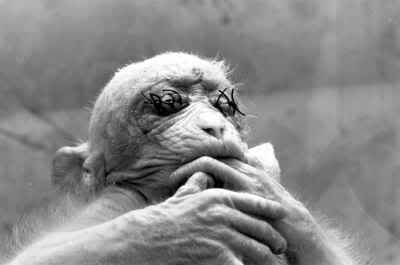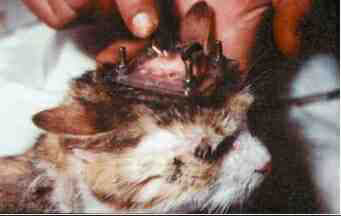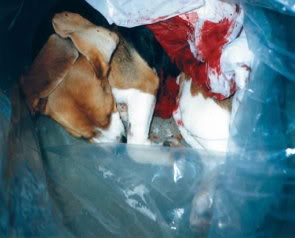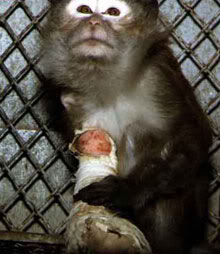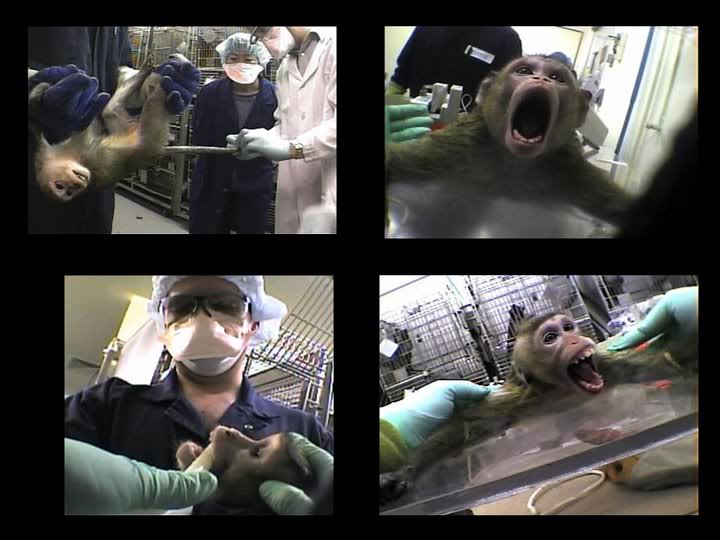Translate This Page
Vivisection" - The dissection of an animal while alive, for the purpose of making physiological investigations.
Animal testing started in the medieval ages when the Christian church declared various edicts forbidding autopsies (they have always been prohibited in Judaism and Islam). Vivisection became more popular in the 1930's when a vaccine was successfully developed due to a blood factor shared by humans and monkeys. Despite thousands of failed and contradictory tests, vivisection continues.
Animals used for vivisection come from a wide range of species including dogs, cats, primates, rabbits, hamsters, guinea pigs, mice, pigs, sheep and other farm animals. It is estimated that over 20 million animals are experimented on per year in the U.S.A. alone.
These animals have no rights, there is no law governing how 'scientists' should treat them and there are no legal requirements for their care and comfort. Animals used for experimentation are subjected to toxic substances such as caustic chemicals and radiation; they are used in chemical and biological weapon experiments, and the pharmaceutical, food and beverage industries. They are electrocuted, they are burnt, they have their eye sight removed, they are deprived of food and water, they are deprived of all forms of natural behaviour, they are confined, scared and suffering. Their only relief is their death - an escape from their living hell.
Why Test on Animals?
There is no need to test on animals:
"The Fact that 68% of drug related deaths last year were as a result of legal drugs; that animal testing is less than 30% accurate (flipping a coin is 50% accurate!); that 61% of birth defects are caused by drugs passed safe in animal tests; and that 1 in every 6 patients in hospital are there because of treatment they have taken, are just some of the reasons why vivisection makes no sense." -
Some of the fatal drugs which vivisection deemed safe include Clioquinol (used for Diarrhoea) which caused blindness, paralysis and death, Thalidomide (tranquilliser) caused birth defects and fetal deaths, Paracetamol (painkiller) caused users to be hospitalised, Phenformin (diabetes treatment) caused 1,000 deaths annually, E-Ferol (vitamin E solution) killed premature babies, caused birth defects and acne, Flamamil (rheumatism treatment) caused loss of consciousness, and the list goes on.
Tobacco companies were able to hide the negative effects which cigarette smoking has on people by testing on dogs, mainly beagles, which are resilient to the cancer-causing effects of cigarette smoke. Beagles are still subjected to smoking tests which involve hours of cigarette smoke being pumped into their lungs daily.
Chimps are still subjected to HIV tests even though more knowledge has been acquired from human patients. Drugs are re-tested on animals which have already been tested before. And why? Because animal testing is big business. Governments, animal breeders, pharmaceutical and cosmetic companies and many more stake holders make big euros from animal testing, This is why, despite the many alternatives, vivisection still exists
Less than 2% of human illnesses (1.16%) are ever seen in animals. Over 98% never are.
At least 50 drugs on the market cause cancer in lab animals. They are allowed because it is admitted that animal tests are not relevant.
When asked if they agreed that animal experimentation can be misleading because of anatomical and physiological differences between animals and humans, 88% of doctors agreed.
Rats are 37% effective in identifying what causes cancer in humans. Flipping a coin would be more accurate.
According to animal tests lemon juice is deadly poison, but arsenic, hemlock and botulism are safe.
40% of patients suffer side effects as a result of prescription treatment.
Over 200,000 medicines have been released most of which are now withdrawn. According to the World Health Organisation, 240 medicines are essential.
Thousands of drugs passed safe in animals have been withdrawn or banned due to their effect on human health.
Aspirin fails animal tests, as do digitalis (heart drug), cancer treatments, insulin (causes animal birth defects), penicillin and other safe medicines. They would be banned if results from animal experimentation were accurate.
When the producers of thalidomide were taken to court, they were acquitted after numerous experts agreed animal tests could not be relied on for human medicine.
At least 450 methods exist with which we can replace animal experiments.
Morphine puts humans asleep but excites cats.
95% of drugs passed by animal tests are immediately disgarded as useless or dangerous to humans.
One is six patients in hospital are there because the drug they have taken had been passed safe for us on humans after animal tests.
Worldwide, at least 22 animals die every second in labs. In the UK one animal dies every five seconds.
The contraceptive pill causes blood clots in humans but it had the opposite effect in dogs.
We use aspirin for aches and pains. It causes birth defects mice, rabbits and rats.
Researchers refused to believe that benzene could cause cancer in humans because it failed to in animal tests.
Dogs failed to predict heart problems caused by the cardiovascular drugs encainide and flecainide, which led to an estimated 3,000 deaths in the USA.
Heart bypass surgery was put on hold for years because it did not work on dogs.
If we had relied on animal tests we would still believe that humans do not need vitamin C, that smoking does not cause cancer and alcohol does not cause liver damage.
It was denied for decades that asbestos caused disease in humans because it did not in animals.
Polio researchers were mislead for years about how we catch the disease because they had experimented on monkeys.
As one researcher points out, "the ultimate dilemma with any animal model of human disease is that it can never reflect the human situation with complete accuracy."
